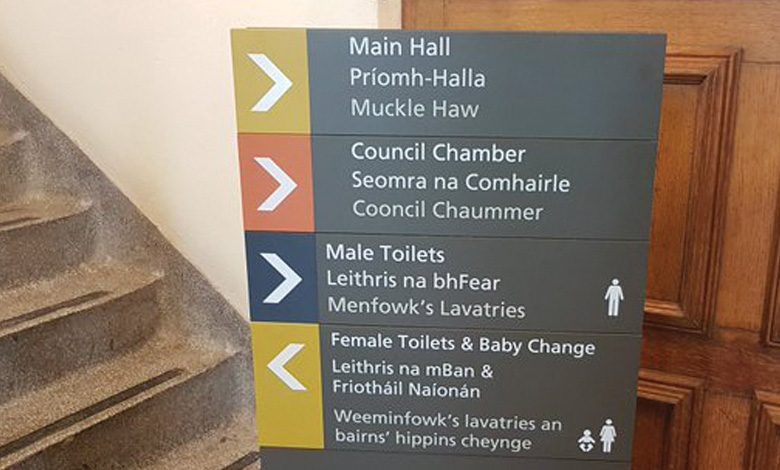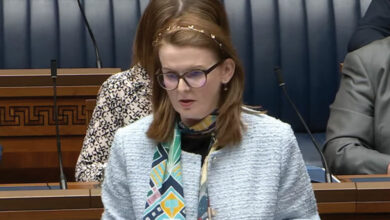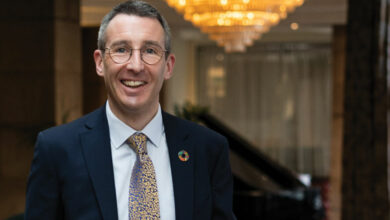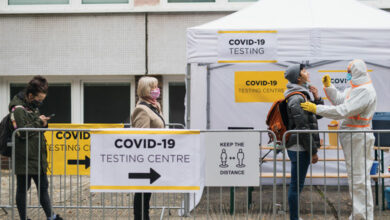More bilingual signage needed to signal Northern Ireland is ‘shared’
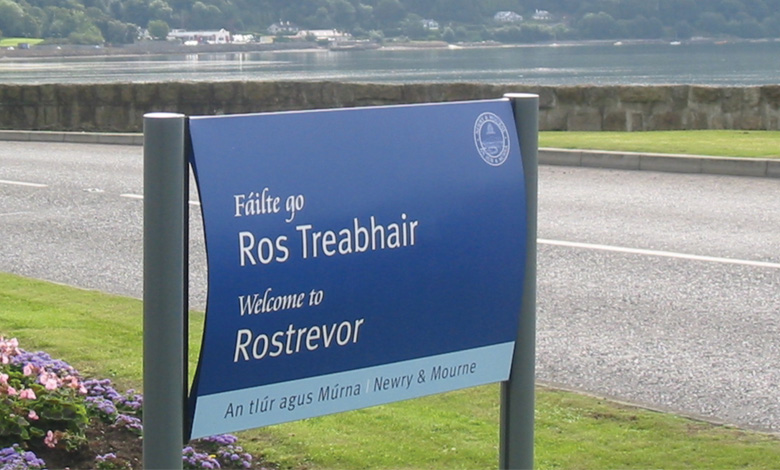
The Council of Europe (CoE) has said that more bilingual signage should be implemented in Northern Ireland in order to send the message that the “territory is shared”, but has warned that the naming of an Ulster Scots commissioner as “Ulster British” could “further contribute to the sectarianism surrounding cultural questions”.
These comments were made in the CoE’s fifth monitoring report on the UK’s compliance with the Council’s convention for the protection of national minorities. The report investigated the status of national minorities and issues such as language and cultural rights, racism, integrated education, and the legacy of conflict within all four constituent members of the UK.
The report returned four main findings for Northern Ireland:
1. That the lack of an Executive over the report’s monitoring cycle is “undoubtedly hindering the implementation of the Framework Convention and the situation is alarming for the Advisory Committee”. The absence of functioning Executive has “maintained the focus on post-conflict issues which are entrenched along political divides – which overshadows the issues of any other minorities and paralyses issues relating to language and identity”.
2. That education remains split along religious lines and that there is “evidence that children growing up in these contexts fear the prospect of integration” given the “weight of history” on society. The CoE also states that Brexit has been “felt in a particular way in Northern Ireland” and that there are “fears” that negotiations surrounding Brexit have “reignited tensions of the past”. Legacy proposals brought by the UK Government “purport to foster good relations but may threaten to destabilise the peace through the potential to grant conditional immunity from prosecution, and not pursuing any further prosecutions”. These divisions, the Council says, call for “greater efforts to pursue integrated education through boosting the number of places available in integrated schools”. Among the CoE’s recommendations for immediate action is that authorities increase the share of pupils and students attending integrated schools and that they “seek to actively motivate parents and provide incentives for pupils and students studying in such schools, with a view to creating a fully integrated education system”.
3. Proposals relating to the Irish language and Ulster Scots that have been passed by the UK Parliament are “welcome”, but the Council warns that the proposals “further contribute to the sectarianism surrounding cultural questions”, with the appointment of a commissioner for Ulster Scots as being “for the Ulster Scots and the Ulster British tradition” conflating a minority identity with a distinct political one.
4. That the situation for people from Black, Asian, and minority ethnic backgrounds and Irish Travellers is “particularly alarming”, with Northern Ireland having the highest rates of hate crime in the UK per capita and Travellers being absent “from any form of representation or participation – even consultation by Government”. The lack of equality data collated in Northern Ireland “prevents concrete solutions being established”.
Language rights
Among its main findings on language rights, the CoE states that there is a “good level” of language protection in Wales and England, but that “more could be done in Northern Ireland”. Further incentives for teachers of minority languages are said to be needed, particularly for Irish and Scottish Gaelic and it is said that, in general in the UK, a lack of permanent consultation fora with linguistic minorities prevents the raising of areas of concern on a regular basis with government and authorities.
In its recommendations for immediate action, the CoE “urges” the authorities to “intensify their efforts to develop and increase the offer and support to Irish-medium education in Northern Ireland, including for children with special educational needs”. The report’s further recommendations include the Advisory Committee calling on the authorities to ensure the implementation of the Identity and Language (Northern Ireland) Bill.
With regard to the Bill, the recommendations also state that the authorities should “work with representatives of the Irish-speaking community to further develop Irish language policy in Northern Ireland” and “consider revising the Bill in consultation with the Ulster Scots minority representatives to address the conflation of Ulster Scots and Ulster British identities”. Representations from Ulster Scots speakers to the CoE are said to have “highlighted the insufficient state support for their language, the lack of action in diverse fields” and said that their “time and resources are mostly spent defending their interests from political debate”.
Reiterating its Framework Convention, the CoE states that “bilingualism in signposts should be promoted as it conveys the message that a given territory is shared” and that it is “concerned that the lack of transparency as to [bilingual signage application] procedures in Northern Ireland”. It further stats that the “burdensome requirements for implementing minority language signage create a practical and disproportionate obstacle” to implementation. The two-thirds threshold utilised by many councils for the instalment of bilingual signage is described as “demonstrably prohibitive” and notes the Council is satisfied that this threshold has been lowered to 15 per cent of responses being positive and non-responses are no longer being counted as negative in Belfast. Representatives to the Council from the Irish language community stated their frustrations at variations between municipalities.
Considering these factors and related ones for Scottish Gaelic and Cornish, the Advisory Committee asks the authorities to “guarantee a transparent and consistent approach to the display of topographical indications in minority languages across England, Scotland and Northern Ireland, in conformity with Article 11(3) of the Framework Convention”, as is the UK Government’s responsibility as a member of the CoE.

